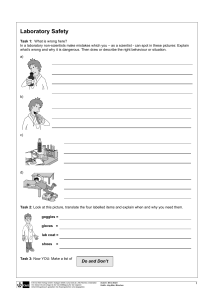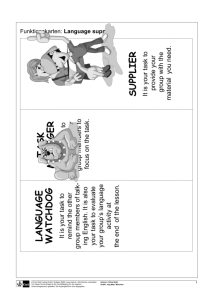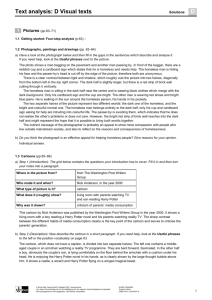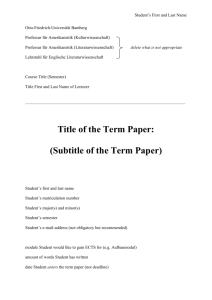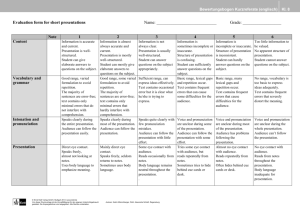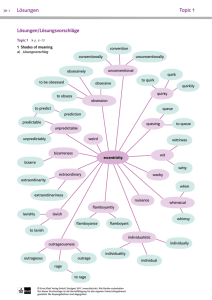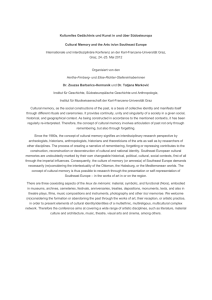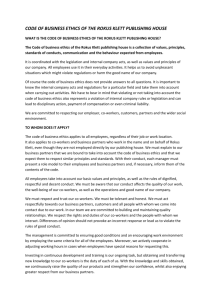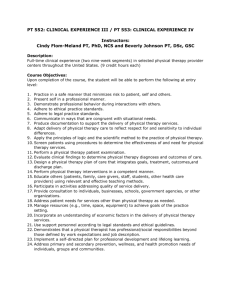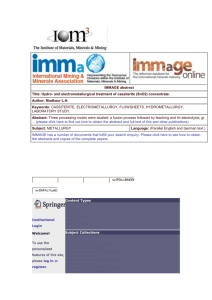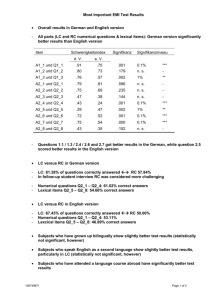Playway_4_TB
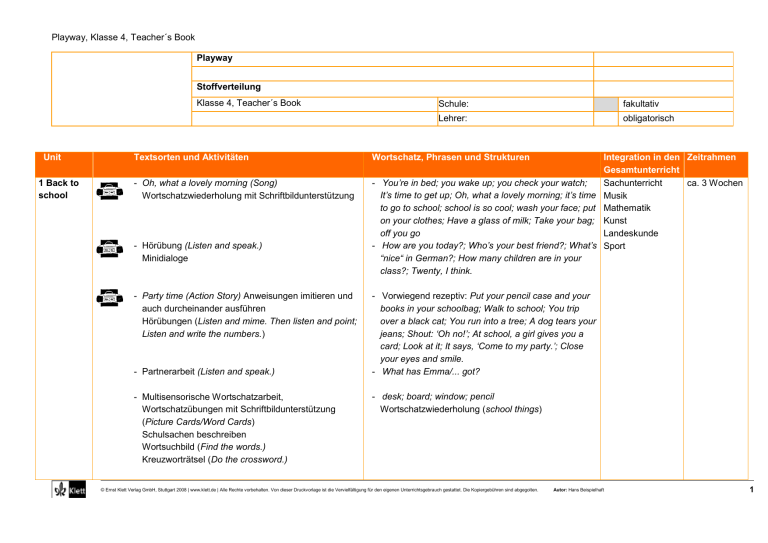
Playway, Klasse 4, Teacher´s Book
Playway
Stoffverteilung
Klasse 4 , Teacher´s Book
Unit
1 Back to school
Schule:
Lehrer: fakultativ obligatorisch
Textsorten und Aktivitäten
- Oh, what a lovely morning (Song)
Wortschatzwiederholung mit Schriftbildunterstützung
- Hörübung (Listen and speak.)
Minidialoge
- Party time (Action Story) Anweisungen imitieren und auch durcheinander ausführen
Hörübungen ( Listen and mime. Then listen and point;
Listen and write the numbers.
)
- Partnerarbeit (Listen and speak.)
- Multisensorische Wortschatzarbeit,
Wortschatzübungen mit Schriftbildunterstützung
( Picture Cards/Word Cards )
Schulsachen beschreiben
Wortsuchbild ( Find the words.)
Kreuzworträtsel ( Do the crossword.)
Wortschatz, Phrasen und Strukturen
- You’re in bed; you wake up; you check your watch; off you go
- How are you today?; Who’s your best friend?; What’s
- Vorwiegend rezeptiv: Put your pencil case and your
-
It’s time to get up; Oh, what a lovely morning; it’s time to go to school; school is so cool; wash your face; put on your clothes; Have a glass of milk; Take your bag;
“nice“ in German?; How many children are in your class?; Twenty, I think. books in your schoolbag; Walk to school; You trip over a black cat; You run into a tree; A dog tears your jeans; Shout: ‘Oh no!’; At school, a girl gives you a card; Look at it; It says, ‘Come to my party.’; Close your eyes and smile.
What has Emma/... got?
- desk; board; window; pencil
Wortschatzwiederholung ( school things )
© Ernst Klett Verlag GmbH, Stuttgart 2008 | www.klett.de | Alle Rechte vorbehalten. Von dieser Druckvorlage ist die Vervielfältigung für den eigenen Unterrichtsgebrauch gestattet. Die Kopiergebühren sind abgegolten. Autor: Hans Beispielhaft
Integration in den
Gesamtunterricht
Zeitrahmen ca. 3 Wochen Sachunterricht
Musik
Mathematik
Kunst
Landeskunde
Sport
1
Playway, Klasse 4, Teacher´s Book
2 Going places
- Clever Joe (Cartoon Story)
Lückentext
Erzählen und Rekonstruktion der Geschichte
- Wortschatzwiederholung und -erweiterung mit
Schriftbildunterstützung ( Picture Cards/Word Cards )
- Culture Special: Clara from Germany goes to school in Boston, USA
Hörübung ( Listen and read Clara’s e-mail to her class in Germany.
)
Hör- und Leseübungen
-
-
-
Schreibübung: My text (Read. Write your own text.)
- Multisensorische Wortschatzarbeit mit
Schriftbildunterstützung (
Come to my party (Chant)
Hör- und Sprechübung
Picture Cards/Word Cards
(Listen and speak.)
- Kreuzworträtsel (Do the crossword.)
- Interviews durchführen und über die Ergebnisse berichten (Ask your classmates. Take notes. Then talk about your classmates.)
)
- Vorwiegend rezeptiv: OK, children; Tomorrow there’s a maths test; Ok, sir; All the animals are doing maths;
It’s the next day; The maths/English test; I can’t do it;
Let’s go to the circus; Great! Fantastic! Yes, let’s;
Ladies and gentlemen! I’m sorry. Our acrobat’s ill;
Can I try?; Sure. Come here; Ladies and gentlemen, give Joe a big hand!; Aaaah. I know! Practice!; Yes, sir; Come here, please; You can do it! Well done!
- school bus; Where’s ...?; How many … are there?;
What’s ...?; How old is ...?; How does ... get to school?
Vorwiegend rezeptiv: Dear friends, I like my new school in Boston; In my class there are 22 children; Our teacher is Mrs Kelly; She is very nice; My best friend is
Kim; She is 10 years old; I teach Kim German words;
She can say …; School begins at 9 o’clock; At half past eight I get on the school bus at the corner of our street;
I get home at four; Please write soon; Love
- I’m in class 4a this year; There are 16 girls and 15 boys in my class; My teacher is Mrs Schmidt; She’s very nice.
- Come to my party on Saturday at eight; Listen how to get there, and don’t be late; You can’t walk or go by bike; I live far away/on a star; Take my rocket;
Aaaah!; By bus/underground/car/train; I walk
- Vorwiegend rezeptiv: How do you get to school?; My father takes me; How does Simon/… get to school?
- How do you get to school?; He/she walks; Michael/... gets to school by bus/...
Kunst
Sachunterricht
Mathematik
Verkehrserziehung
Musik ca. 3 Wochen
© Ernst Klett Verlag GmbH, Stuttgart 2008 | www.klett.de | Alle Rechte vorbehalten. Von dieser Druckvorlage ist die Vervielfältigung für den eigenen Unterrichtsgebrauch gestattet. Die Kopiergebühren sind abgegolten. Autor: Hans Beispielhaft
2
Playway, Klasse 4, Teacher´s Book
-
-
-
- Hörübungen (Listen and point.)
-
A treasure hunt (Mr Matt Sketch)
Lückentext
Schreibübung: own text.)
Wortschatzeinführung mit Schriftbildunterstützung
(Picture Cards/Word Cards)
Minidialoge
Hörübung
My way to school (Read. Write your
(Listen. Act out the dialogues.)
(Listen. Find the way to John’s, Carol’s,
Adam’s and Diana’s houses. Mark the houses with a cross.)
- Kommunikationsspiel (Colour and speak.)
- Your birthday present …; What about it?; It’s in a box; And where’s the box?; Here’s a map. Go and find the box; All right. No problem. Treasure – here I come! Ah, where’s my mobile?; Here it is, Dad; Good.
Just in case …; First, climb the mountain; Climb the mountain? There are no mountains here!; Ah! There it is! “The big mountain” – here I come!; Help! I’m stuck. You ’ve got to help me!; All right, Dad. We’re coming; I’ll do it; Oh, no! It’s too high! It’s too dangerous!”; Help! This bridge is dangerous. You’ve got to help me!; Phew! Not easy. But now … treasure, here I come!; Turn left and take three steps forward; Ah. Watch out for the tree!; Go down the hill on the silver snake!; OK. Start!; I can’t. I’m scared;
Come on!; I’ve got it! I’ve got it!; Open it, Dad!; I can’t;
OK. We’re coming!; I don’t like toffees!; But we do!
Happy birthday, Dad!
- My way to school; I get to school by bus; There are always lots of children in the bus; I walk to school; I walk with my friend Peter; I get to school by car; My mum takes me.
I walk along … for … minutes; There are lots of shops; I like the sweet shop best.
- t urn left/right; go straight on; go across the bridge;
Excuse me, please; Where‘s the cinema/park/supermarket?
- Find the way to John’s house; John’s house is on the left side of the street; sweet shop
© Ernst Klett Verlag GmbH, Stuttgart 2008 | www.klett.de | Alle Rechte vorbehalten. Von dieser Druckvorlage ist die Vervielfältigung für den eigenen Unterrichtsgebrauch gestattet. Die Kopiergebühren sind abgegolten. Autor: Hans Beispielhaft
3
3
Playway, Klasse 4, Teacher´s Book
Halloween
-
-
Hör- und Schreibübung
Then write.)
Wortschatzübungen mit Schriftbildunterstützung
(Picture Cards/Word Cards)
Kommunikation mit Hilfe vorgegebener Redemittel
(Talk in class.)
A class survey
(Listen. Fill in the numbers.
- Rollenspiel (Work with a partner. Speak.)
- Wortschatzerweiterung (Zahlen von 16 bis 100 bzw.
10.000)
- Culture Special: A quiz – Travelling in London
-
-
-
Hörübung (Look and guess. Then listen and check.)
Würfelspiel: Snakes and ladders (Play the game.)
I’m scared (Chant)
The goat (Cartoon Story)
Lückentext
Erzählen der Geschichte
- A monster is looking at you (Action Story)
A nweisungen imitieren und auch durcheinander ausführen
Hörübungen (Listen and mime. Then listen and point.
Listen and fill in the numbers.)
- It’s in Green Street; All right; Thank you very much;
Turn right at the school/park; Can I help you?; I’d like to go to the Roxy cinema.
- underground train; the numbers from 16 to 100 bzw.
100 to 10,000; One thousand and two hundred flights
Nur rezeptiv: forty minus twenty is twenty; travelling; flights; There are about …
- Start; Finish; Throw the dice; It’s your turn; It’s my turn.
- I’m scared of monsters/skeletons/witches/mice/…;
What are you scared of?; Are you scared of monsters/...?; Yes, I am; No, I’m not.
Rezeptiv: Who’s scared of monsters/…?; Who is not scared of …?
- Are you scared of spiders/frogs/snakes/dogs?; I’m not scared of spiders/frogs…; Oh, really? Are you never scared?; Of course, I am!; I’m so scared of monsters, under my bed, monsters in the attic, monsters in the shed.
- Vorwiegend rezeptiv: Baaah; What’s that?; I’ll go and check; There’s a goat in our garden; A goat?; Shoo!
Go away!; Grrrrgh!!!! Stop eating our vegetables. Off you go; Let’s get a stick; A stick? Good idea!; Help!
Help!; What a crazy goat!; Trick or treat!; Can you help us, please?
- Nur rezeptiv: Put on your monster suit/mask; Go to the bathroom; Look in the mirror; A monster is looking at you; Run away.
Sachunterricht
Musik
Kunst
Landeskunde
Sport
© Ernst Klett Verlag GmbH, Stuttgart 2008 | www.klett.de | Alle Rechte vorbehalten. Von dieser Druckvorlage ist die Vervielfältigung für den eigenen Unterrichtsgebrauch gestattet. Die Kopiergebühren sind abgegolten. Autor: Hans Beispielhaft ca. 4 Wochen
4
Playway, Klasse 4, Teacher´s Book
-
-
Gedächtnisübung
Minidialoge
(Look and remember. Speak.)
Culture Special: Halloween
Hörübung (Look and listen.)
- Leseübung und Rollenspiel (Read and act out. Create your own story.)
- Schreibübung: My text (Read. Write your own text.)
-
-
Hör- und Schreibübung (Listen and write Yes or No.
Then complete the sentences.)
Hey-ho for Halloween (Rhyme)
- Bastelanleitung (Make a Halloween monster mask.)
- What about Lucy/…?; She’s scared of …; She isn’t scared of …; They are … They aren’t …
Nur rezeptiv: October 31st is Halloween; Children in
Britain and the USA dress up as monsters, witches or ghosts; The children go from door to door; They call out
‘Trick or Treat!’; Most people give the children sweets; pumpkin lantern
- Are your scared of frogs?; No, I’m not; There’s a spider on your head!; Help!; I like dogs; But my dad is scared of dogs.
- Wiederholung: He/She is/isn’t scared of ...
- Hey-ho for Halloween; all the witches can be seen; some in black/ green; scared; ghosts; keletons;witches; mice; monsters; What are you scared of?; Are you scared of snakes/...?; Yes, I am;
No, I’m not. Nur rezeptiv: Paint the paper bag orange;
Draw the nose, the eyes and the mouth like this; Cut out the nose, the eyes and the mouth; Paint the strip of paper, cut fringes and stick the hair on the mask;
Fasten a string to the top of the head; Let’s hang the masks up in the classroom.
- Take the paper bag; Cut off the handles; Paint the paper bag orange; Draw the nose, the eyes and the mouth; Cut out the nose, the eyes and the mouth;
Paint the strip of paper, cut fringes and stick (the hair) on the mask; Fasten a string to the top of the head;
Let’s hang the masks up in the classroom.
© Ernst Klett Verlag GmbH, Stuttgart 2008 | www.klett.de | Alle Rechte vorbehalten. Von dieser Druckvorlage ist die Vervielfältigung für den eigenen Unterrichtsgebrauch gestattet. Die Kopiergebühren sind abgegolten. Autor: Hans Beispielhaft
5
Playway, Klasse 4, Teacher´s Book
Units 1 –3
Show what you can do
4 Pets
- Selbstevaluierung: Zuordnungs- und Schreibübungen,
Leseübungen (Write the words in the lists. Match. Write.
Read and write. Match. Write the numbers.)
- Multisensorische Wortschatzarbeit mit
-
-
-
-
Schriftbildunterstützung
Ratespiel
Hörübung
Partnerarbeit
(Picture Cards/Word Cards)
(Listen and point.)
(Test your partner.)
The thief (Mr Matt Sketch)
Lückentext
Hörübung (Listen and tick.)
Kommunikation mit Hilfe vorgegebener Redemittel
(Talk about the children’s pets.)
Hör- und Leseübung (Listen and read. Then remember and speak.)
Gedächtnis- und Sprechübung (Partnerarbeit)
- Multisensorische Wortschatzwiederholung mit
-
-
Schriftbildunterstützung (Picture Cards/Word Cards)
Minidialoge; Interviews durchführen classmates. Take notes.)
(Ask five
- Kommunikation mit Hilfe vorgegebener Redemittel
(Talk about your classmates and their pets.)
Leseübung
Schreib
(Look and read.)
übung (Look and write.)
- hamster, budgie, guinea pig, pony
- Vorwiegend rezeptiv: Dad?; Can I have a banana/an orange, please?; Here you are; Just a minute; It’s empty; That’s very/ strange!; Can I have some crisps, please?; Come on, Danny! Let’s go!
- Lisa/… has got a …; It’s brown/…; It’s four/… (years old).
Rezeptiv: Have you got a pet?; What is it?; What colour is it?; How old is it?
- Jennifer has got a … .; It’s … old.
Hi, I‘m Emily/Jennifer…; I‘ve got a pony/dog/budgie/fish tank/…. It‘s five years old; They are sixteen weeks old; It’s eight months old.
- colours
- Have you got a pet?; What is it?; What colour is it?;
How old is it?; Yes, I have; No, I haven’t; Peter hasn’t got a pet.
- I’ve got a mouse; He’s/She’s got a cat/hamster …;
They’ve got a dog.
Sachunterricht
Kunst
Musik
Landeskunde
© Ernst Klett Verlag GmbH, Stuttgart 2008 | www.klett.de | Alle Rechte vorbehalten. Von dieser Druckvorlage ist die Vervielfältigung für den eigenen Unterrichtsgebrauch gestattet. Die Kopiergebühren sind abgegolten. Autor: Hans Beispielhaft ca. 4 Wochen
6
Playway, Klasse 4, Teacher´s Book
5 Shopping
-
- Lese-
-
-
Mice, mice, mice (Song)
Suchbild write.)
(Do the puzzle. Then tick true or false.) und Schreibübung
Schreibübung:
Hörübung
(Read Sally’s texts and
My text (Read. Write your own text.).
Culture special: Thanksgiving
(Listen and read the story.)
- Multisensorische Wortschatzarbeit
Cards/Word Cards)
A hundred big black ravens (Song)
(Picture
- Culture Special: British money
Hörübung (Listen and point.)
Rechenspiel zur Schulung der Wahrnehmung (Play the game with a partner.)
- Who has got a mouse/...?; I like their little ears/...;
Little mice are really nice; My mum/dad hates mice, but I think mice are really nice; I give them cheese/rice.
- I’ve got a cat; Her name is Tipper; She’s brown, grey and white; She’s two years old; My friend Bob has got a rabbit; His name is Flopsy; I like Flopsy; He’s white and grey; He’s three years old.
- I haven’t got a pet; My grandma has a budgie; The budgie’s name is Jimmy; It’s blue, yellow and green;
I’ve got a cat and a dog; My cat is three and my dog is four years old; The cat’s name is Socks; The dog’s name is Buddy.
- Vorwiegend rezeptiv: It’s the year 1620 in America; A big ship, the Mayflower, lands; It comes from
England; It is full of people; The people are cold and hungry; Native Americans give them food and clothes; The white people build houses; The Native
Americans help them to grow corn and to hunt; The white people make a big party for the Native
Americans; They thank them for their help; Every year, there is a big Thanksgiving Day parade in New
York; Every year, people in the USA have a
Thanksgiving Day; It is on the last Thursday in
November; On that day people eat turkey, sweet potatoes and pumpkin pie.
- Wiederholung der Zehnerzahlen von 10 bis 100; A hundred big black ravens; Are flying after you; They want to steal your piggy bank; So this is what you do;
You pull a face; You shake your fist; You shout “No way!”; And ten fly away.
Sachunterricht
Musik
Mathematik
Kunst
Sport
- pence; one pound twenty/…; Close/open your eyes;
How much is it?
© Ernst Klett Verlag GmbH, Stuttgart 2008 | www.klett.de | Alle Rechte vorbehalten. Von dieser Druckvorlage ist die Vervielfältigung für den eigenen Unterrichtsgebrauch gestattet. Die Kopiergebühren sind abgegolten. Autor: Hans Beispielhaft ca. 3 Wochen
7
Playway, Klasse 4, Teacher´s Book
-
-
Going shopping (Mr Matt Sketch)
Lückentext
- Spiele mit Zahlen
Lese- und Malübung
Rechenspiele
Hörübung
Sätze ordnen
Lückentext
(Read and colour the frames.)
(Listen and circle.)
- Wortschatzarbeit mit Schriftbildunterstützung (Picture
Cards/Word Cards)
Hörübung (Listen and read. Then speak.)
Rollenspiele, Minidialoge (Change the dialogue and act it out.)
- Hörübung (Listen to the shopping dialogue. Write.)
(Put the sentences in the correct order.
Then listen and check.)
(Fill in is or are.)
- Multisensorische Wortschatzarbeit mit
Schriftbildunterstützung (Picture Cards/Word Cards)
Wortschatzspiele zur Verankerung im
W iedererkennensgedächtnis und
Produktionsgedächtnis
- Vorwiegend rezeptiv: There’s no food in the house;
Can you go shopping?; Let’s make a shopping list!; I haven’t got a pen/note pad; Here’s the pen/note pad; carrots; hamburgers; apples; cucumbers; fish; potatoes; cheese; pears; Where’s my coat?; OK, I’m ready. Let’s go!; Sorry, Dad! We’re busy. We’re making a house of cards; It’s nice, isn’t it?; It’s very good; More cheese?; Have a nice day; No trolley!; No shopping list!; Hello kids! I’m back!; What’s for dinner?; I forgot the fish/potatoes/cheese; Lovely burgers!
- ninety-five pence
Rezeptiv: How much are the scissors?
- vanilla; yoghurt; lemon; hazelnut; Two ice creams, please; What flavours?; For me vanilla and chocolate, please; And for me strawberry and yoghurt, please;
OK. Here you are; How much is it?; £2; Thank you;
Goodbye.
- How much is the blue cap?; How much are the white and pink trainers?; a pair of white socks; trainers;
That’s £27, please.
- potatoes; onions; carrots; green/red peppers; tomatoes; cucumbers; fruit; vegetables
© Ernst Klett Verlag GmbH, Stuttgart 2008 | www.klett.de | Alle Rechte vorbehalten. Von dieser Druckvorlage ist die Vervielfältigung für den eigenen Unterrichtsgebrauch gestattet. Die Kopiergebühren sind abgegolten. Autor: Hans Beispielhaft
8
Playway, Klasse 4, Teacher´s Book
6 At home
-
-
Hörübungen
Ratespiel
(Listen and point. Listen and read.
Change and act out.)
Rollenspiel
An umbrella for Max (Story)
Rollenspiel (Listen and point. Then listen again and act out the dialogue.)
Schreibübung: My text (Read. Write your own text.)
- No money, no sweets (Action Story) Anweisungen imitieren und auch durchei nander ausführen
Hörübungen (Listen and mime. Then listen and point.
Listen and write the numbers.)
-
-
-
Hörübung und Rollenspiel sketch.)
(Listen and act out the
Wortschatzeinführung mit Schriftbildunterstützung
(Picture Cards/Word Cards)
(Play the game.)
Wortschatzübungen mit Schriftbildunterstützung
(Picture Cards/Word Cards)
Verstehensübung (Look at the pictures on page 30.
Find the things.)
Fragespiel (Ask the partner.)
- I hate the rain!; I can’t open it; This umbrella looks nice; How can I open it?; What a wonderful umbrella.
- I often go shopping for my mum; I buy fruit and vegetables; I buy cheese, ham and milk.
- Vorwiegend rezeptiv: Open your piggy bank; Take out a two-pound coin; Walk to the supermarket; Pick up a bag of sweets; Go to the cash desk; Put your ha nd in your pocket; Nothing!; There’s a big hole in your pocket; Take the sweets back.
- Lovely T-shirts!; How much is the blue T-shirt?; Do you like it?; Yes, it’s nice; What’s in your bag?; Wow, can I try it on?; Of course; Yes, it’s great; It’s from the flea market; Fleas? Help! Help!
- under; in; on; behind; in front of; next to; Where are
Tom’s/his socks?; Where are Kate’s/her trainers?; On the sofa in the living room; Where’s her pullover/umbrella/…?
Sachunterricht
Kunst
Musik
Landeskunde
- opposite; between; wardrobe, bed, chair, curtains
© Ernst Klett Verlag GmbH, Stuttgart 2008 | www.klett.de | Alle Rechte vorbehalten. Von dieser Druckvorlage ist die Vervielfältigung für den eigenen Unterrichtsgebrauch gestattet. Die Kopiergebühren sind abgegolten. Autor: Hans Beispielhaft ca. 3 Wochen
9
Playway, Klasse 4, Teacher´s Book
-
-
-
-
-
Möbelstücke basteln. and a wardrobe.)
(Make a desk, a chair, a bed
Hörübung (Listen to Simon and put the things in his room.
The racoon in my room (Song)
Merkübung, Schreibübung
The hats in the attic (Cartoon Story)
Lückentext
Erzählen der Geschichte
Rollenspiel für leistungsstarke Gruppen
Schreibübung:
(Look and write.)
My room (Write the words.)
- In my room the desk is in front of the window with the blue curtains; There’s a chair behind the desk; The bed is opposite the desk …
- There’s a racoon/a little racoon in my room; He’s drinking my milk/ eating my bread/breaking my toys/usi ng my bed; Please, Mum, don’t come in;
There’s a mess in my room; I think my racoon won’t leave before June; Don’t tell anybody my little racoon is just an excuse for the mess in my room.
- bookcase; washbasin; sofa; lamp; table; cupboard
- old; king; princess; marry; golden shoe; Try it on;
Does it fit?; , It doesn’t fit; It fits.
Vorwiegend rezeptiv: Let’s go to the attic; There are lots of old things up there; Look at that!; Wow; It really looks old; Let’s open it; What a crazy hat; There’s another one; Le t’s put them on; Who are these men?;
Who are you?; Welcome, Prince Benny/Princess
Linda; The king and the princess are coming; Here is the golden shoe; Try it on; It must fit you; Then you can marry the princess; It doesn’t fit Prince
Rupert/Prince Gregory ; You can’t marry my daughter;
The golden shoe doesn’t fit; Try on the shoe; Hurrah, it fits you; Prince Benny, marry me; Marry you? I can’t. I’m only ten; Take the hat off; What are you doing in the attic?
- In my room there’s a nice bed; The desk is in front of the window; Next to the desk there’s a big wardrobe;
There are three posters in my room; On the posters there are three horses.
© Ernst Klett Verlag GmbH, Stuttgart 2008 | www.klett.de | Alle Rechte vorbehalten. Von dieser Druckvorlage ist die Vervielfältigung für den eigenen Unterrichtsgebrauch gestattet. Die Kopiergebühren sind abgegolten. Autor: Hans Beispielhaft
10
Playway, Klasse 4, Teacher´s Book
Units 4 –6
Show what you can do
7 Feelings
- Culture special: Living in Cornwall/London - Rock is a small village by the sea, and it’s very beautiful; We have many miles of sandy beaches;
You can go sailing, windsurfing, surfing and water skiing; My friends and I are good at surfing; The beaches of Cornwall have fantastic waves; This is my brother in our boat; He loves sailing; Living in
London; Come to London and take a ride!; This is my favourite museum, the Natural History Museum; It has a very big fossil of a Brontosaurus; The theme park at Alton Towers has some fantastic rides!; But my mum says they’re scary!
- Selbstevaluier ung: Zuordnungübung, Lese- und
Schreibübungen (Read and write the numbers.
Read and write. Match. Write the numbers.)
- Multisensorische Wortschatzarbeit mit
Schriftbildunterstützung (Picture Cards/Word Cards)
- Hörübung (Listen and point.)
Hör- und Gedächtnisübung feelings.)
Partnerarbeit
(Listen and remember the
(Crazy sentences. Work with a partner.)
- Ratespiel (Play the game with a partner.)
Hörübung (Listen to the dialogues.)
Minidialoge (Work in pairs. Change the dialogues and act them out.)
-
-
- Wortfelder erkennen
-
-
Zuordnungsübung
Schreibübung
(Match the words with the faces.)
(Write about the children.)
(Find the odd one out.)
Snow White (Cartoon Story)
Lückentext
- Rekonstruktion der Geschichte
- scared/angry/sad/tired/happy; There’s a fox with yellow socks; Emily, kiss the apple tree; There’s a pink hippo in our garden; Number one is ‘sad’; I don’t think so. I think it’s ‘angry’.
Nur rezeptiv: Thirteen monkeys are dancing rock ‘n’ roll; What feeling was it?
- Tell me about Lisa/...; What about Lisa/...?; I think he’s/she’s angry/...; That’s right; No, sorry. She’s happy/…
- Wortschatzwiederholung (feelings)
- queen; heart; mirror; airport; chocolates
Vorwiegend rezeptiv: Mirror, mirror, who’s the best singer?; That’s Snow White, my queen; You stupid
Musik
Sachunterricht
Kunst
Sport
© Ernst Klett Verlag GmbH, Stuttgart 2008 | www.klett.de | Alle Rechte vorbehalten. Von dieser Druckvorlage ist die Vervielfältigung für den eigenen Unterrichtsgebrauch gestattet. Die Kopiergebühren sind abgegolten. Autor: Hans Beispielhaft ca. 3 Wochen
11
Playway, Klasse 4, Teacher´s Book
-
-
Friends (Song)
Hörübung (Listen and point.)
A happy frog (Chant)
Kreative Schreibübung (Write your own chant. Draw pictures.)
- Partnerarbeit
- The football (Action Story) Anweisungen imitieren und auch durcheinander ausführen
Hörübungen (Listen and mime. Then listen and point.
Listen and write the numbers.)
- Minidialoge
-
Dialog: Mum, what can I do? (Listen to the dialogue.
Act it out.)
Leseübung (Read Drago’s letter. Draw his girlfriend.) mirror!; Ted, kill Snow White and bring me her heart;
Where are we going, Ted?; To the airport, Snow
White; You must go away; A sheep’s heart, please;
I’m (not) alone in the city; I have no friends; You’re the best singer in the world; Soon Snow White is a big star; Millions see her on TV; You must help Snow
White; Here are your favourite chocolates; I’ve got friends.
- I’m not alone in the city; I’m so happy I’ve got friends;
We laugh and shout, we run around and hop; We sing and dance, we never, never stop.
- hungry; thirsty; A happy/hungry/… frog/dog…; are having a chat just like that
- Vorwiegend rezeptiv: You’re thirsty. You get a carton of orange juice; You go out into the garden; You trip over your football; Now there’s orange juice all over your clothes; You’re angry; You kick your ball; Crash!
The window breaks; Your dad is very angry; You mpty your piggy bank.
- Mum, what can I do?; Play with your computer;
Boring; Go swimming; Swimming?; It’s too cold outside; Answer the door, Debbie; Hi, Debbie; Let’s go swimming; Great idea!; Where are you going, ebbie?; I’m going swimming with Sylvia; Bye, Mum!;
Bye, Mrs Gilder!
- Vorwiegend rezeptiv: Dear friend, I’m in love with
© Ernst Klett Verlag GmbH, Stuttgart 2008 | www.klett.de | Alle Rechte vorbehalten. Von dieser Druckvorlage ist die Vervielfältigung für den eigenen Unterrichtsgebrauch gestattet. Die Kopiergebühren sind abgegolten. Autor: Hans Beispielhaft
12
Playway, Klasse 4, Teacher´s Book
8 Free time - Multisensorische Wortschatzarbeit mit
-
-
Schriftbildunterstützung (Picture Cards/Word Cards)
David’s week (Chant)
Sprechübung
- Hörübung (Listen and remember. Then talk about the children.)
Minidialoge (Talk in class.)
Busy Lizzy (Song)
- Wortschatzwiederholung m
(Word Cards) it Schriftbildunterstützung
Hör- und Schreibübung (Listen and write.)
Schreibübung (Write what Annabel does.)
Tilly; She is a very beautiful girl; She has got a red mouth and yellow teeth; Her hair is green; She has got orange eyes and black ears; I love her!; Tilly is wonderful; She likes cheese; She has got a dog; Best wishes, Drago; Here is a picture of my darling; Isn’t she lovely?
- On Monday/Tuesday… David rides his horse/ plays tennis/rides his bike/plays volleyball; on Wednesday
Dave and Jennife r/… sail their boat to Venice/David and his mum/… go to the shopping mall; Dave’s at the swimming pool; He dives from the 5-metre board;
Hey! That is really cool!; Picture number 1: It’s
Thursday
- Can you ride a horse/in-line sake/skate/ski/dance/swim...?; Yes, I/you can; No,
I/you can’t; Jessica/she can/can’t...; Sam/he an/can’t...; Are you good at it?; No, not really.
Rezeptiv: I play it with my friends all the time; My dad showed me.
- Busy Lizzy; Her name is Lizzy; she’s so busy; She’s got so many things to do; She feeds the squirrels in the park, she plays the saxophone; She rides her bike around the town, and then she dances with a clown; She goes sailing every day, and she plays volleyball; She cooks spaghetti for her friends, her busy day just never ends.
- On Monday/… he plays football/plays volleyball/plays tennis/he rides his bike/rides his horse/he swims in the river; And on Sunday he rests.
- Wortschatzwiederholung: unicycle
Sachunterricht
Musik
Landeskunde
Kunst
© Ernst Klett Verlag GmbH, Stuttgart 2008 | www.klett.de | Alle Rechte vorbehalten. Von dieser Druckvorlage ist die Vervielfältigung für den eigenen Unterrichtsgebrauch gestattet. Die Kopiergebühren sind abgegolten. Autor: Hans Beispielhaft ca. 2 Wochen
13
Playway, Klasse 4, Teacher´s Book
9 We’re so hungry
-
-
-
Lückentext (Complete.)
Kreative Schreibübung (Write. Then create your own text about Sammy.)
- Schreibübung: My text (Read. Write your own text.)
Culture special: Children and sports
Hörübung: (Listen and read. Say who is who.)
Schreibübung (Look and write.)
Hör- und Sprechübung (Listen and say.)
- Sammy can’t ski/in-line skate/ride a bike; But he can cook spaghetti
- I can sail a boat/…; I’m good at it; My best friend is
Oliver; He is 9; He plays football a lot; He is very good at it. Vorwiegend rezeptiv: Hi, I’m Dave and I’m from London; I can dive from a 3metre board!; I’m
Claire. I’m from Cardiff. I can sail my dad’s boat. I’m very good at it!; I’m Tony from Oxford; I can ride a unicycle; It’s great fun!; Hi, I’m Sandra; I’m from York;
I can swim for one hour; I’m very good at it; I’m
Christopher; I’m from Dublin; I can run 2 miles; Hi! I’m
Kathy; I can snowboard and skate.
- This is Danny; He’s my best friend; He’s 9 years old;
He plays football a lot; He’s very good at it; This is my brother Ron; He’s 11 years old; Ron can cook spaghetti and make fruit salad; This is Emily; She’s my best friend, She’s 9 years old; She can ride a horse; Sarah and Christine are my best friends;
They’re ten years old; They’re very good at in-line skating; This is me; I’m 10 years old; I can dive from a 3-metre board; I like it a lot; I play volleyball a lot.
- I think number one is …
Vorwiegend rezeptiv: Number one. She likes hamburgers and pizza. She doesn’t like hot dogs and
Sachunterricht
Musik
Mathematik fish and chips. She also likes chicken and rice; OK. Kunst
Listen again; Who is it?; Number two. She likes chicken and rice and pizza. She doesn’t like hot dogs,
Sport amburgers and fish and chips …
© Ernst Klett Verlag GmbH, Stuttgart 2008 | www.klett.de | Alle Rechte vorbehalten. Von dieser Druckvorlage ist die Vervielfältigung für den eigenen Unterrichtsgebrauch gestattet. Die Kopiergebühren sind abgegolten. Autor: Hans Beispielhaft ca. 3 Wochen
14
Playway, Klasse 4, Teacher´s Book
9 We’re so hungry
- Multisensorische Wortschatzarbeit mit
-
Schriftbildunterstützung (Picture Cards/Word Cards)
Luba’s restaurant (Song)
What’s for breakfast? (Mr Matt Sketch)
Lückentext
- Wortschatzeinführung mit Schriftbildunterstützung
(Picture Cards/Word Cards)
Hörübung (Listen and remember. What are they having?)
Sätze bilden (How many true sentences can you make? How many lies can you make?)
- Wortschatzspiele
Hörübung play.)
(At the restaurant. Listen. Then do a role
Rollenspiel
- Interviews durchführen und die Ergebnisse notieren.
(Interview four friends. Write and draw.)
Über Gruppenergebnisse berichten. (Talk about your classmates.)
- Toffees for Annabel (Cartoon Story)
Lückentext
Rekonstruktion der Geschichte
- Luba’s restaurant; Luba’s is a crazy restaurant;
Luba’s is the place to go; Luba’s is the place for you and me; come here and you’ll see!; There is … fish in your orange juice and ice cream on your steak; fruit on your pizza; and salad on your cake!; Yeah; There are … nuts in your tomato soup; and coffee on your pie; and on top of your dessert is a fly!; Oh, no!
- Vorwiegend rezeptiv: We’re hungry; What’s for breakfast, Dad?; Tea and toast?; OK; Dad, where’s our toast?; A smoothie?; Yoghurt. Milk; Orange or banana?; Sorry. No smoothie; But Dad, we’re hungry!; Eggs?; Hey. Watch this!; Don’t worry; There are two more eggs.
- mixed salad; orange juice; sausages; lemonade; cola; steak; mineral water; peas; beans; Dad/Mum is having ... with ... Nur rezeptiv: What would you like to eat/drink?; I’d like ...; OK, madam; Very well, sir; young man; of course
- apple pie; fruit salad; main course; desserts; drinks; chocolate cake; cheesecake; What would you like to eat/to drink/for dessert?
- Harry, do you like chocolate cake/fish…?; No, I don’t;
Yes, I do; In my group 4 children like fruit salad. 3 children don’t like chocolate cake.
- Vorwiegend rezeptiv: Would you like some cheese,
Annabel?; What about chicken with rice and peas?; I can make you some sausages with beans; Please,
© Ernst Klett Verlag GmbH, Stuttgart 2008 | www.klett.de | Alle Rechte vorbehalten. Von dieser Druckvorlage ist die Vervielfältigung für den eigenen Unterrichtsgebrauch gestattet. Die Kopiergebühren sind abgegolten. Autor: Hans Beispielhaft
15
Playway, Klasse 4, Teacher´s Book
Units 7 –9
Show what you can do
10
Favourite places
- Fast food (Action Story) Anweisungen imitieren und auch durcheinander ausführen
Hörübungen (Listen and mime. Then listen and point.
Listen and write the numbers.) make me some toffees; Don’t eat too many;
Annabel/I can’t open her/my mouth; Sorry, I can’t help you; Yes, of course; You must call Dr
Simpson/the fire brigade; Turn the water on; Let me try something; What a clever idea; What would you like, my darling?
- You are hungry; Take a knife; Cut an apple into small pieces; Put a piece in your mouth; Eat it; Oh no! It’s stuck in your throat; Run into the kitchen; Drink some water; Ah! It goes down.
- Have some pizza/cheese/…; don’t be shy!
- Don’t be shy (Listen and read the poem. Then write your own poem.)
Kreative Schreibübung mit Partnerarbeit
- Selbstevaluierung: Zuordnungs- und
Schreibübungen, Leseübung (Write the words in the lists. Match. Write. Read and write. Match. Write the numbers.)
-
-
My favourite place (Action Story) Anweisungen imitieren und auch durcheinander ausführen
Hörübungen (Listen and mime. Then listen and point.
Listen and write the numbers.)
Flying in a jet plane (Song)
- Hörübung (Look at the pictures and listen to the story.
Then read out the sentences in the correct order.)
- fridge; The kitchen is my favourite place.
Nur rezeptiv: You’re asleep; At midnight you hear a bell; You wake up; Go downstairs; Open the fridge;
Make yourself a cheese sandwich.
- Flying in a jet plane; I’m flying in a jet plane; fast and high; I’m racing through the sky; I’m on my way to
London; with friends from near and far; From
England, Germany and Spain; hey, in my super plane; Yeah!; From Austria and Italy; from Greece and Hungary
- Sue is eating her cheese sandwich; Then she goes to bed; At half past twelve a mouse comes into the kitchen; It takes the cheese and runs away; At
Sachunterricht
Musik
Landeskunde
Kunst
Sport
© Ernst Klett Verlag GmbH, Stuttgart 2008 | www.klett.de | Alle Rechte vorbehalten. Von dieser Druckvorlage ist die Vervielfältigung für den eigenen Unterrichtsgebrauch gestattet. Die Kopiergebühren sind abgegolten. Autor: Hans Beispielhaft ca. 2 Wochen
16
Playway, Klasse 4, Teacher´s Book
-
-
-
Hörübung places.)
(Listen and fill in the
Leseübung (Read and tick.)
Max at the rodeo (Cartoon Story)
Lückentext
Rekonstruktion der Geschichte
Culture special: Famous sights
Hörübung check.)
(Listen and speak.)
Minidialoge children’s favourite
(Guess the countries. Then listen and quarter to one Dad wakes up; He is hungry and goes down into the kitchen; He opens the fridge; There is no cheese; Then he sees a bit of cheese on the floor;
‘I can’t understand this,’ Dad says; ‘A mouse can’t open a fridge ’; Then he goes back to bed.
- Vorwiegend rezeptiv: I’m Muriel from Sydney; My favourite place is our swimming pool; This is Brent/... from San Francisco/...; His/her favourite place is his bed/the park near her house; We’re Jerry and
Jennifer from Cairns, Australia; Our favourite place is the beach; Daniel and Debbie are from Scotland;
They love cooking; Their favourite place is the kitchen.
- rodeo rider
- Vorwiegend rezeptiv: Let’s go to the rodeo; Yes, let’s; Can I try?; It’s dangerous; Please let me try; No way, Max!; He’s really great; Yes, he’s fantastic;
Ladies and gentlemen, this is Max, the best rodeo rider in the world; Come back; Stop thief!; This man is a thief; Here’s your money; Here’s a hundred dollars for you; Come and try again; Let’s have some ice cream.
- Vorwiegend rezeptiv: Famous sights; They speak
English and French in this country; There are lots of mountains and beautiful lakes; This is the national symbol of this country; This country is a continent;
The Grand Canyon is one of the most famous sights of this country; In this country there are beautiful castles; Its capital is London; The most famous mountain in this country is called Table Mountain;
The capital of this country is Wellington; South Africa;
© Ernst Klett Verlag GmbH, Stuttgart 2008 | www.klett.de | Alle Rechte vorbehalten. Von dieser Druckvorlage ist die Vervielfältigung für den eigenen Unterrichtsgebrauch gestattet. Die Kopiergebühren sind abgegolten. Autor: Hans Beispielhaft
17
Playway, Klasse 4, Teacher´s Book
Extra Unit
On holiday in
Australia
-
-
-
Lückentext
Worträtsel und Hörübung (Find the words.
Write them in the lists. Listen and check.)
- Mr Crocodile and Dr Kangaroo (Cartoon Story)
Lückentext
Rollenspiel
(Fill in the words. Then listen and check.)
Schreibübung (Write about yourself.)
- Culture special: Holidays in Australia
Hörübung (Listen and read the texts. Find the correct answers in the box. Listen again and check.)
Partnerarbeit
New Zealand; Ireland
- This is Nicola from Britain. Her favourite place is her garden; Hi, we are Jesse and Liz from New York. Our favourite place is the Natural History Museum; We love dinosaurs; Hi, I’m James from Canada. My favourite place is the river behind our house; Roy and
Alexandra are from London. Their favourite place is their grandpa’s farm; This is Tony from Miami. His favourite place is his dad’s boat.
- Wortschatzwiederholung: countries; places; feelings; days of the week; body; animals; sports; food
- Vorwiegend rezeptiv: nurse; Dr Kangaroo is the best doctor in town; Next, please; Sorry, no crocodiles;
Send him away; Come in, Mr Crocodile; Your leg is broken; See you in four weeks; What a lovely kangaroo; Cat ch me!; Now the crocodile can’t run; It’s four weeks later; Sleep well; The leg’s OK; I’ve finished; You can go home now; Here’s the key.
Landeskunde
- On holiday in Australia; The Great Barrier Reef;
Kakadu National Park; Ayers Rock; koala; kangaroo;
Sydney; This building looks like a big ship; But it is not a ship; It is an opera house; You can see it in the largest and oldest city in Australia; The city is on the sea; What’s its name?; This animal lives only in
Australia; This is a famous mountain; Tourists love to visit it; Some tourists climb to the top of the mountain;
These are the pictures from a place in northern
Australia; You can see lots of crocodiles there; There are also beautiful birds; Many tourists come to this place; They go diving and snorkelling; They go by boat to one of the many islands; You can see
© Ernst Klett Verlag GmbH, Stuttgart 2008 | www.klett.de | Alle Rechte vorbehalten. Von dieser Druckvorlage ist die Vervielfältigung für den eigenen Unterrichtsgebrauch gestattet. Die Kopiergebühren sind abgegolten. Autor: Hans Beispielhaft ca. 1
WocheKunst
Landeskunde
Musik
Sport
18
Playway, Klasse 4, Teacher´s Book
Extra Unit
Christmas
Musical play
Tammy, the queen of jams
-
- A Christmas card (Action Story) Anweisungen imitieren und auch durcheinander ausführen
Hörübungen (Listen and mime. Then listen and point.
Listen and write the numbers.)
-
-
Wortschatzeinführung mit Hilfe von Realia
Hörübung (Listen and point.)
Partnerarbeit (Play the game.)
The Christmas tree (Song)
Tammy, the queen of jams (musical play) play wahlweise:
Rezeptive Erarbeitung oder Aufführung als musical
- beautiful fish; This animal lives in eastern Australia; It sleeps during the day.
silver bell; golden star; snowman; golden angel; candle; present
- Nur rezeptiv: Take a piece of paper; Put it on your desk; Draw a Christmas tree; Colour it; Cut it out;
Glue it on a card; Write ‘Merry Christmas’ and your friend’s name; Give it to your friend; Your friend smiles and says, ‘Thank you’
Kunst
Landeskunde
Musik
Sport
- Take some silver bells, take a golden star; Put them on the Christmas tree and sing along with me; Join hands and start dancing around the big tree; and sing
‘Merry Christmas, Merry Christmas’ with me; Take a little snowman/some golden angels
- Vorwiegend rezeptiv: Hello girls and boys; Welcome everyone; Welcome to our musical play; kitchen; pot; sugar; castle; king; cook; servants; take it away; the best jam in the world; I can’t work for you; No one can take Tammy away.
Musik ca. 1 Woche ca. 1 –2
Wochen
© Ernst Klett Verlag GmbH, Stuttgart 2008 | www.klett.de | Alle Rechte vorbehalten. Von dieser Druckvorlage ist die Vervielfältigung für den eigenen Unterrichtsgebrauch gestattet. Die Kopiergebühren sind abgegolten. Autor: Hans Beispielhaft
19
